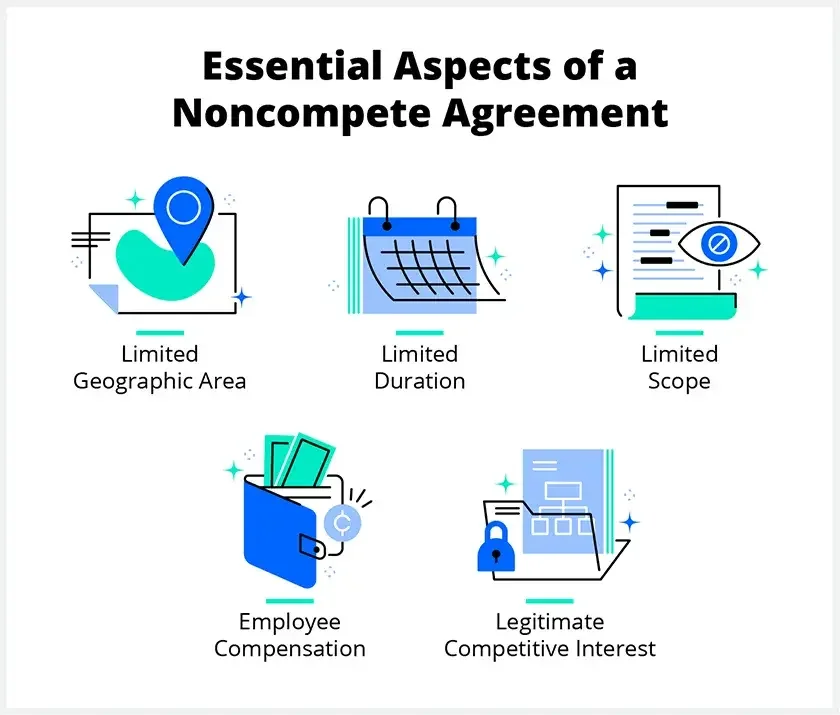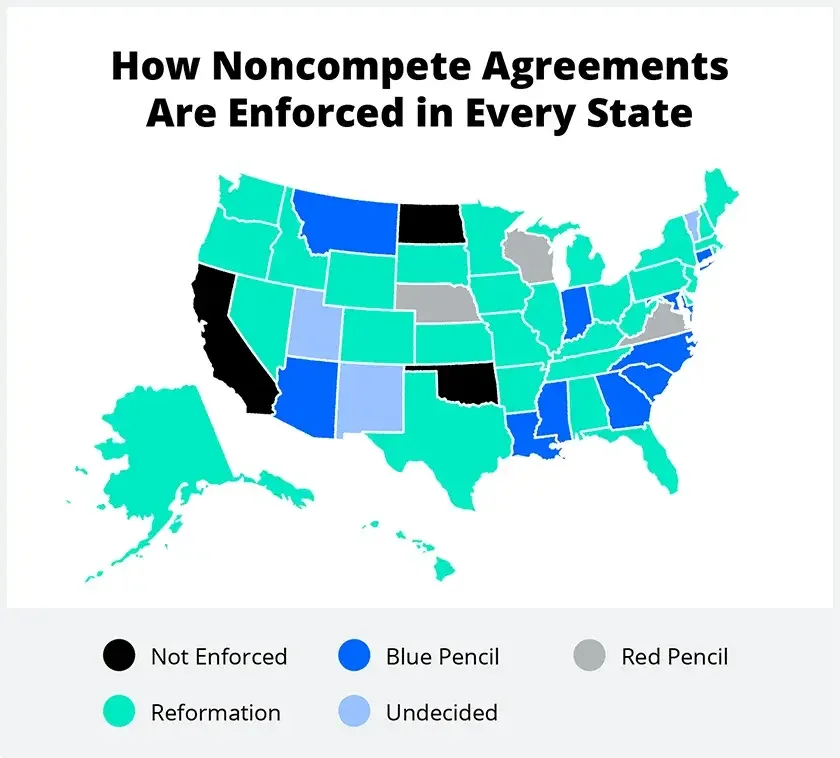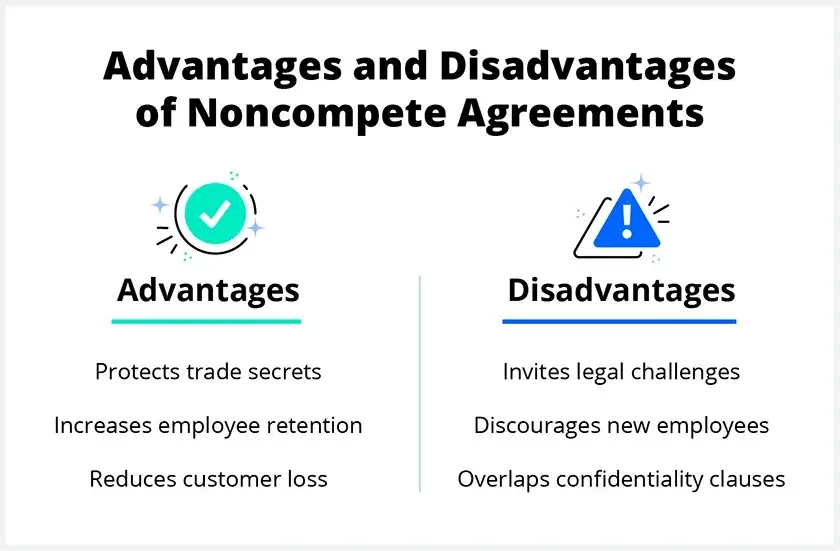Noncompete agreements are contracts that companies use to reduce competition and prevent the spread of trade secrets. Like other contracts, a noncompete agreement is a binding document, and employees who sign them can't enter into direct competition with their former employer after leaving their job. Usually, this means that an employee can't work in certain industries or at particular companies for a set period of time.

You can write full-fledged noncompete provisions using a template in just a few minutes. However, more complex agreements should be written with the support of an attorney specializing in contracts, business, labor, and employment, since these contracts can be found unenforceable if their terms are too broad.
Read on, and we'll answer all of the following questions:
- What is a noncompete agreement?
- How do noncompete agreements work?
- Which states enforce noncompete agreements?
- What are the advantages and disadvantages of noncompete agreements?
What is a noncompete agreement?
A noncompete agreement is a contract that an employer can use to prevent employees from taking certain jobs with competitors after they leave the company. Sometimes, an employer can make signing a non-compete agreement a condition of employment. These contracts benefit a company by preventing former employees from using trade secrets to give another company a competitive advantage or starting a company that competes with a former employer.
A noncompete agreement can also be referred to as a covenant not to compete, a noncompete covenant, a noncompete clause, or simply a noncompete.
While these agreements are useful for employers, they must be crafted carefully to be enforceable. We'll show you which details are essential to make a noncompete work.
How does a noncompete agreement work?
Noncompete agreements are beneficial tools for companies hoping to protect their position in the market, but the contract can't be unreasonable.

When determining whether a noncompete is reasonable, courts consider several factors:
- Compensation: An employer must offer some benefit to the employee in exchange for limiting future opportunities. For new employees, the job offer itself is generally considered sufficient compensation. Still, existing employees asked to sign a covenant not to compete may be entitled to a raise or promotion.
- Legitimate Competitive Interest: A company must have a legitimate competitive interest that the agreement serves to protect, like trade secrets or proprietary information.
- Limited Duration: A noncompete clause can't last indefinitely. While reasonable standards vary based on circumstance, a period of one to two years is common.
- Limited Geographic Area: An employer can't prohibit employees from working in a large geographic area since this would prevent them from making a living.
- Limited Scope: A noncompete agreement must be limited in scope. For instance, a contract might be limited to a particular industry or several companies that are direct competitors.
All these factors contribute to a court's determination of whether a particular agreement is enforceable. That said, how noncompete agreements are enforced—and whether they are enforced at all—varies from state to state.
Enforcement of noncompetes by state
States enforce noncompete agreements in a variety of ways. Some states have specific statutes governing these contracts, whereas others follow precedents from past court rulings. Several states, like California, explicitly forbid contracts that include noncompete clauses.
Most states, however, allow for agreements that are considered reasonable—though standards for “reasonableness" vary based on jurisdiction and circumstance. Importantly, states can handle unreasonable noncompete clauses in one of three ways:
- Red pencil: In “red pencil" states, a noncompete agreement found to be unreasonable is disregarded, voiding the contract entirely.
- Blue pencil: In “blue pencil" states, only the unreasonable portions of a noncompete clause are voided while the rest of the contract is upheld.
- Equitable reformation: In “equitable reformation" states, the court may re-write a portion of the contract to make it reasonable.
Most states follow the doctrine of “equitable reformation," which enables contracts to be upheld with revisions. For example, a contract that originally lasted five years after an employee's termination may be amended to last for only six months with all other provisions in place.
Below, we've created a map showing the status of noncompete agreements in each state, which is current as of June 2020, using publicly available data.

New laws and statutes emerge for noncompetes every year. Sixteen states have changed laws related to these contracts in the last four years. Additionally, federal laws are being considered that would prohibit noncompete agreements for low-wage employees. Check your state's legislative page for information about current or future laws governing contracts.
Advantages and disadvantages of noncompete agreements
Noncompete agreements are common in many industries, though it's important to understand the benefits and the costs of using them. While a covenant not to compete can protect the company from the competition, it can also open up the possibility of a costly legal challenge.

Advantages:
- Protects trade secrets and proprietary information
- Increases employee retention
- Reduces customer loss
Disadvantages:
- Increased risk of a legal challenge
- May discourage potential employees
- Sometimes redundant with confidentiality clauses
Each company will need to weigh its options in considering whether to use noncompete clauses to protect its competitive advantage. Other options, like confidentiality clauses, may be sufficient to guard trade secrets or intellectual property without restricting employees' future job prospects. However, these clauses often encourage higher employee retention, which leads to a higher return on investment for training each employee.
How to write a noncompete agreement
Writing a legally compliant noncompete agreement used to be an expensive process. That said, it's now possible to create an entire employment contract, including a noncompete clause in just a few minutes by simply filling in a few key details. Hiring a qualified attorney is an affordable and helpful process if you want a legal expert to review your document.

